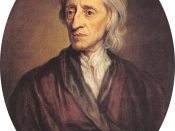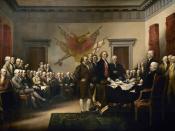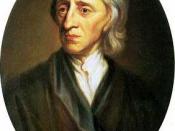English philosopher, John Locke, based his theories on natural law. Locke, as well as another philosopher, Thomas Hobbes, felt that a government should be based on a social contract. Although, Hobbes felt that a social contract is an agreement to give up freedom and live under a ruler, Locke felt that the ruler should have limited power and the government should be acceptable to all citizens. Locke believed people in a state of nature are reasonable and moral. Also they are endowed with certain rights at birth, called natural rights, such as life, liberty, and property. Thomas Jefferson, valued the views of John Locke.
Jefferson based some of the Declaration of Independence on Locke's views. In the Declaration of Independence, it states individuals have certain basic rights that cannot be taken away by any government. "...they are endowed by their Creator with certain unalienable right, that among these are Life, Liberty, and the Pursuit of Happiness..." Jefferson focused on Locke's concept of a 'Social Contract'. Men are born free and equal in rights.
Furthermore, Locke believed that if the ruler loses support of his people, the people have a right to depose the ruler. This is a benefit for the people. Due to the fact that, if the little power that the ruler has, affects his attitude and he starts turning into a monarch...the people have the right to over throw him.
Locke sees that, when a population grows and land has become scarce, rules are needed beyond those which the moral law or law of nature supplies. Thus, the 'Social Contract' comes about. It takes away some of the freedom the people have, in exchange of protection from the ruler. This is a very excellent form of keeping a level of security between the people and...


